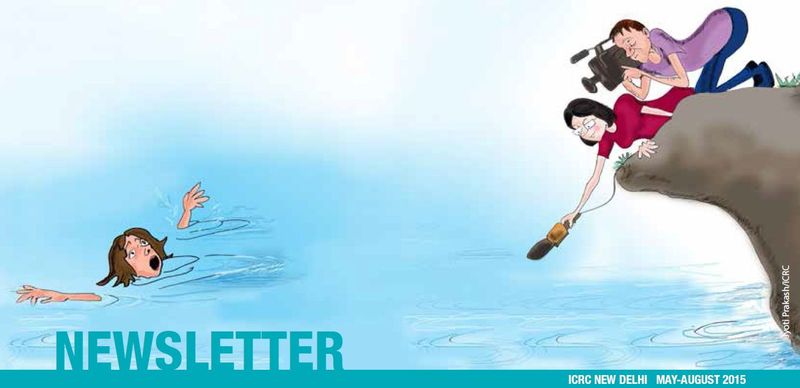 The final quarter of 2015 marks many firsts for us at the International Committee of the Red Cross (ICRC). In the month of September our colleagues in Bangladesh supported a five-nation International Cricket Tournament for people with physical disabilities. The team from India competed alongside teams from Afghanistan, Pakistan, England and the host nation, Bangladesh. The carnival-like atmosphere and enthusiastic all round support to the event in Dhaka is a reminder of the importance of using sporting initiatives and events to work on issues of inclusion for people with disabilities. Back home in the southern Indian city of Chennai, Jess Markt, ICRC’s basketball wheelchair coach from Afghanistan conducted a packed ten days of wheelchair basketball clinics for classifiers, coaches, and referees, as well as camps for both beginners and more experienced players. These were the first technical classes for any adaptive sport ever conducted in India. The Wheelchair Basketball Federation of India (WBFI) and the ICRC have been partnering in a grassroots campaign to build awareness and participation in wheelchair basketball in India since last year.
The final quarter of 2015 marks many firsts for us at the International Committee of the Red Cross (ICRC). In the month of September our colleagues in Bangladesh supported a five-nation International Cricket Tournament for people with physical disabilities. The team from India competed alongside teams from Afghanistan, Pakistan, England and the host nation, Bangladesh. The carnival-like atmosphere and enthusiastic all round support to the event in Dhaka is a reminder of the importance of using sporting initiatives and events to work on issues of inclusion for people with disabilities. Back home in the southern Indian city of Chennai, Jess Markt, ICRC’s basketball wheelchair coach from Afghanistan conducted a packed ten days of wheelchair basketball clinics for classifiers, coaches, and referees, as well as camps for both beginners and more experienced players. These were the first technical classes for any adaptive sport ever conducted in India. The Wheelchair Basketball Federation of India (WBFI) and the ICRC have been partnering in a grassroots campaign to build awareness and participation in wheelchair basketball in India since last year.
New challenges constantly arise demanding new responses, including in humanitarian action. Most organizations including the Red Cross movement need to develop their capacity to innovate and adapt. Thus, another very exciting initiative, also a first for the ICRC globally, is the upcoming Enable Makeathon, organized under the Innovation Initiative of the ICRC. The Innovation Initiative aims to encourage pioneering solutions to humanitarian challenges by harnessing the creative capacity of ICRC partners to respond to the needs of vulnerable persons in emergency situations. The Enable Makeathon aims at forming partnerships with the disability sector – people with disabilities and service providers – corporate sector, not-for-profit organisations, academic and public policy institutions, students and the government, to help create devices that will specifically address for the needs of rural people with disabilities worldwide.
Globally, the ICRC is committed to working with and enhancing the capacities of those implementing programmes related to disability. It has been sponsoring candidates from different countries for specialized courses in Indian institutes. This edition of the newsletter, features stories of some ICRC-sponsored students who are currently undergoing training at Mobility India in Bangalore. The ICRC sees tremendous opportunity in Indian institutions and centres of excellence and continues in its efforts to benefit from their experiences and best practices on disability issues.
The regional delegation is organizing the Health Emergencies in Large Populations (H.E.L.P.) Course in November. This two-week training seeks to enhance the capacity of humanitarian workers in public health, relief in disasters and complex crises. Since 1986 approximately 3,400 professionals have attended the H.E.L.P. course at different venues around the world, conducted in partnership with the World Health Organisation, research institutions and universities. The H.E.L.P course is being organised in India for the very first time this year and will cater to the South Asia region.
In a first of hopefully many similar collab-orations, the New Delhi delegation took its decade-long relationship with the Centre for United Nations’ Peacekeeping (CUNPK), India a step further by co-hosting a regional seminar on “Contemporary Challenges in International Humanitarian Law (IHL) Related to UN Peacekeeping Operations”. Serving military and police officers participated from India – including Generals of the Indian Army who have variously served as UN Force Commanders – and from eight Asian countries, their vast experiences from diverse peacekeeping missions enriching the discussions and deliberations over the two days.
The Regional Delegation continued to support other delegations whenever and in whatever way possible as we realise that conflict zones are in a constant need of professional human resources. The newsletter thus features an article by an Indian colleague on his experience from the field.

